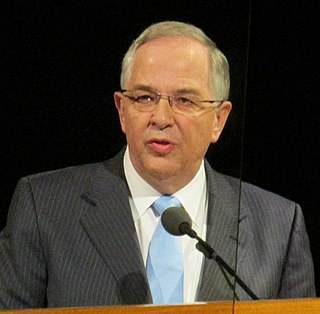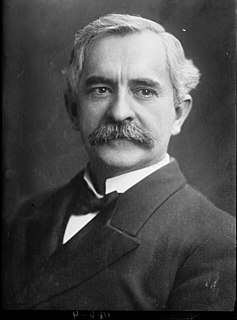A Quote by Dieter F. Uchtdorf
Faith is such a principle of power. God works by power, but this power is usually exercised in response to our faith.
Related Quotes
As patterns of obedience develop, the specific blessings associated with obedience are realized and belief emerges. Desire, hope, and belief are forms of faith, but faith as a principle of power comes from a consistent pattern of obedient behavior and attitudes. Personal righteousness is a choice. Faith is a gift from God, and one possessed of it can receive enormous spiritual power.
There is no such thing as a faithless person; we either have faith in the power of love, or faith in the power of fear. For faith is an aspect of consciousness. Have faith in love, and fear will lose its power over you. Have faith in forgiveness, and your self-hatred will fall away. Have faith in miracles, and they will come to you.
The trouble is that we do not have the power of God in a full manifestation because of our finite thoughts, but as we go on and let God have His way, there is no limit to what our limitless God will do in response to a limitless faith. But you will never get anywhere except you are in constant pursuit of all the power of God.
The gift of faith is a priceless spiritual endowment... Our faith is centered in God our Father, and Jesus Christ, our Savior and Redeemer. It is bolstered by our knowledge that the fullness of the gospel has been restored to the earth; that the Book of Mormon is the word of God; and that prophets and apostles today hold the keys of the priesthood. We treasure our faith, work to strengthen our faith, pray for increased faith, and do all within our power to protect and defend our faith.
There are similarities between absolute power and absolute faith: a demand for absolute obedience, a readiness to attempt the impossible, a bias for simple solutionsto cut the knot rather than unravel it, the viewing of compromise as surrender. Both absolute power and absolute faith are instruments of dehumanization. Hence, absolute faith corrupts as absolutely as absolute power.
Were I to be the founder of a new sect, I would call them Apiarians, and, after the example of the bee, advise them to extract the honey of every sect. My fundamental principle would be ... that we are to be saved by our good works which are within our power, and not by our faith which is not within our power.
Faith stands or falls on the truth that the future with God is more satisfying than the one promised by sin. Where this truth is embraced and God is cherished above all, the power of sin is broken. The power of sin is the power of deceit. Sin has power through promising a false future. In temptation sin comes to us and says: "The future with God on his narrow way is hard and unhappy, but the way I promise is pleasant and satisfying." The power of sin is in the power of this lie.
We need a quickening of faith; faith in the power of the God of Pentecost to convict and convert three thousand in a day. Faith, not in a process of culture by which we hope to train children into a state of salvation, but faith in the mighty God who can quicken a dead soul into life in a moment; faith in moral and spiritual revolution rather than evolution.
We Indians do not teach that there is only one god. We know that everything has power, including the most inanimate, inconsequential things. Stones have power. A blade of grass has power. Trees and clouds and all our relatives in the insect and animal world have power. We believe we must respect that power by acknowledging it's presence. By honoring the power of the spirits in that way, it becomes our power as well. It protects us.
PRACTICE OF THE Art of Peace is an act of faith, a belief in the ultimate power of nonviolence. It is faith in the power of purification and faith in the power of life itself. It is not a type of rigid discipline or empty asceticism. It is a path that follows natural principles, principles, that must be applied to daily living. The Art of Peace should be practiced from the time you rise to greet the morning to the time you retire at night.

































